Whova Alternatives: Top Picks in 2025
If you’ve ever planned an event, you know the tools you use can greatly influence the experience, for both you and your attendees. While Whova has long been a popular event management platform, especially for their mobile app, it’s no longer the only option available.
As expectations increase, organizers are looking for alternatives to Whova that better aligns with their needs in 2025.
Whether you're looking for more customization, better abstract management and peer-review features, or simply a more cost-effective solution, there’s never been a better time to explore what else is out there.
This guide will walk you through the top Whova alternatives, each with its own strengths, with a focus on academic and research conferences.
Why Look for a Whova Alternative
At first glance, Whova is a convenient choice for managing your academic conference. It checks the usual boxes: event registration, mobile app, speaker management, networking features. But when the rubber hits the road, the cracks start to show.
General-Purpose Means Costly Tradeoffs
The reality is that Whova is a general-purpose event management platform. While that works well for organizing a trade show or a corporate seminar, academic events are not generic; they are highly specific, detail-driven, and often involve multiple stakeholders, complex submission workflows, and a need for real precision. This is where Whova begins to feel like the wrong tool for the job. Organizers often find themselves bogged down by the little things that shouldn’t be hard.
Author Information Capture in Submissions
Want to collect detailed author information during abstract submissions? Good luck. Speaker and author information is collected in one big text box. That means you can't send acceptance emails to the right person, or worse, fail to display proper presenter names and their affiliations, undermining both your credibility and your participants’ experience.
Abstract Booklet
Need to export an abstract booklet? Be prepared to roll up your sleeves and spend hours manually piecing it together. There is no way to export all abstracts in a uniform document that can be edited with authors and their affiliations nicely formatted.
Rigid Peer-Review Module
Hoping to tweak the peer-review form to better fit your field’s expectations? You'll quickly face rigid templates and forced compromises. In academic circles, where proceedings might get published or cited, these are real problems that can lower the quality of your entire event.
Underwhelming Virtual Options
Whova's poster session tools for virtual events have left some organizers underwhelmed. Limited interactivity and setup complexity mean missed opportunities for collaboration, exactly the kind of impact presenters are hoping for when they show up.
For academic and research-focused conferences, virtual poster sessions are often an important piece that boost engagement and that virtual attendance is looking forward to.
Steep Learning Curve and User Experience
Then there's the user experience. “There was a small learning curve … I would struggle to get back to the screen I was looking for,” writes one reviewer on G2. Another on Capterra notes: “Whova had a lot of different components that made it overwhelming.”
For time-strapped teams, every hour lost to figuring out navigation or how to use a software is a hit to productivity. Products that try to cater to too many audiences and that have an overwhelmingly large set of features (that you don't need for the most part) have a complex user interface that is tedious to learn.
Complex Pricing that Charge you for Every Bits and Pieces
Add in concerns about pricing, such as hidden costs for add-ons, opaque quotes, and sticker shock for smaller research budgets. Some users experienced publication and visibility limits as well as attended notification spamming.
It’s no surprise that many organizers are asking whether there’s a better fit.
Top Whova Alternatives for Conferences
The good news? In 2025, several event management solutions are emerging that cater specifically to the needs of academic and scientific event organizers. These tools prioritize usability, flexibility, and features that closely match how these events are actually run.
Below, you’ll find a breakdown of popular event platforms. We compared them feature by feature and each has its own table, so you can evaluate them individually based on your needs.
Fourwaves: Best for Academic, Scientific and Research-Based Conferences
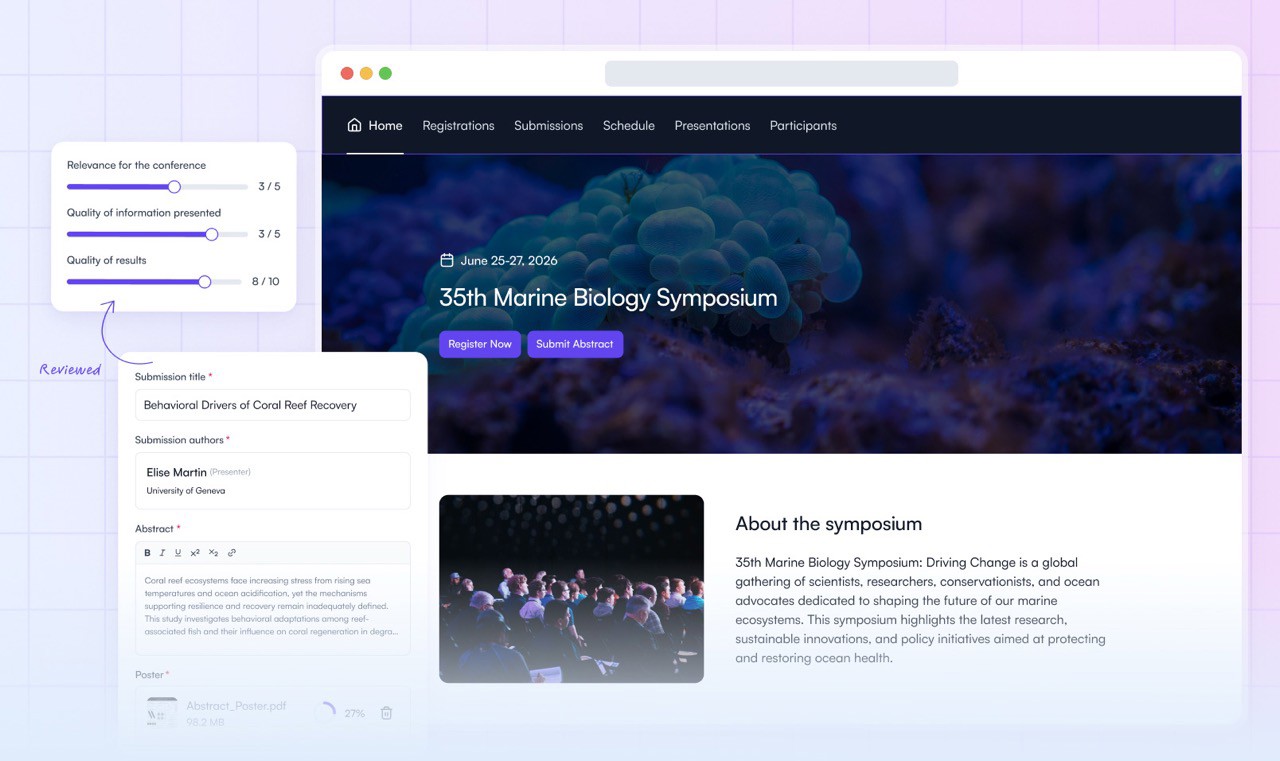
Designed specifically for academic, scientific and research conferences, Fourwaves is a purpose-built academic conference software.
What distinguishes it is the meticulous attention to the needs of academic, scientific and research-focused events. It simplifies complex workflows without overwhelming organizers with technical burdens. You can choose which modules you want. The platform includes:
- A fully customizable event website that's easy to edit;
- A customizable registration forms and payment system;
- Flexible and robust abstract submission forms, able to collect precise author information, presentation materials and more;
- Managing track/topic committees;
- Managing the peer-review that adapts to your own custom flow needs
- Publishing a detailed conference program
- Exporting a custom abstract booklet
- Sending mass emails to registrants and presenters
- Generating ready to print name tags.
- Sending certificates and more.
You don’t need any technical expertise when using Fourwaves. It was built so that an event can be set up in minutes, not weeks. No technical expertise is required and the learning curve is small.
If you’re searching for a Whova alternative suited for events that gathers researchers and academics, Fourwaves is in a class all on its own.
|
Feature |
Included |
|
Academic, Research, Scientific focused |
Yes |
|
Abstract management |
✔ |
|
Can you capture the author information in the submission form? |
✔ |
|
Peer-review capabilities |
✔ |
|
Track/Topic committee management |
✔ |
|
Conference website builder |
✔ |
|
Program builder with sessions and nested submission |
✔ |
|
AI assistant |
✔ |
|
Certificates of attendance |
✔ |
|
Virtual poster sessions |
✔ |
|
Integration capabilities (API) |
✔ |
|
Pricing model |
Per year, customizable. |
|
Ease of use |
High |
|
Gamification |
No |
Get started with Fourwaves today and handle abstracts, reviews, scheduling, and registration—all in one intuitive platform.
vFairs: Best for Immersive Virtual and Hybrid Conference Experiences
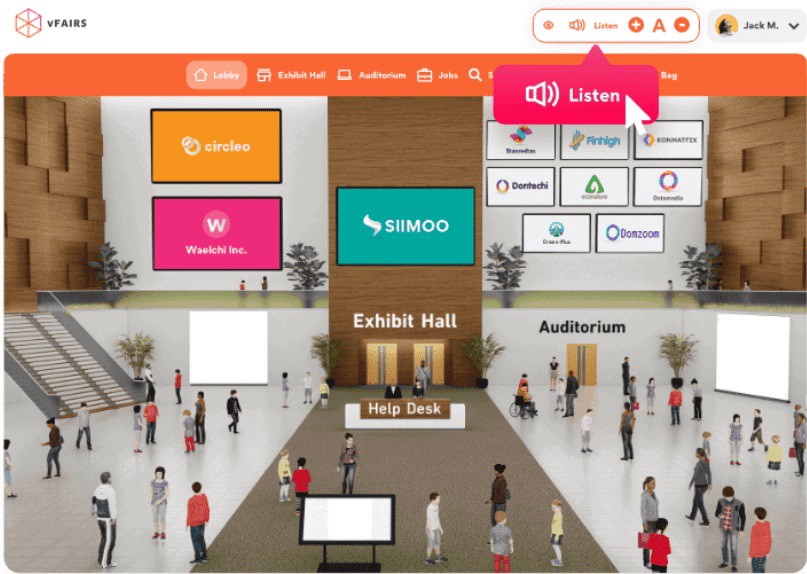
vFairs delivers highly visual, interactive experiences for virtual and hybrid events. Think virtual lobbies, 3D exhibit halls, and customizable avatars, making it an ideal platform for conferences that prioritize engagement and interaction. It’s packed with features for webinars, live streaming, networking, and real-time chat.
However, the platform may feel overwhelming for smaller teams or first-time users. As a Whova alternative, it excels in audience engagement and offers flexible branding options. It is less effective in academic-specific workflows.
|
Feature |
Included |
|
For academic, scientific and research-based conference |
No |
|
Abstract management |
✔ |
|
Can you capture the author information in the submission form? |
✔ |
|
Peer-review capabilities |
✔ |
|
Track/Topic committee management |
✔ |
|
Conference website builder |
✔ |
|
Program builder with sessions |
✔ |
|
AI assistant |
✔ |
|
Certificate of attendance |
✔ |
|
Virtual poster sessions |
Basic |
|
Integration capabilities (API) |
✔ |
|
Pricing model |
Annual license/pay-per event |
|
Ease of use |
Medium |
|
Gamification |
✔ |
Eventtia: Best for Customizable Event Workflows
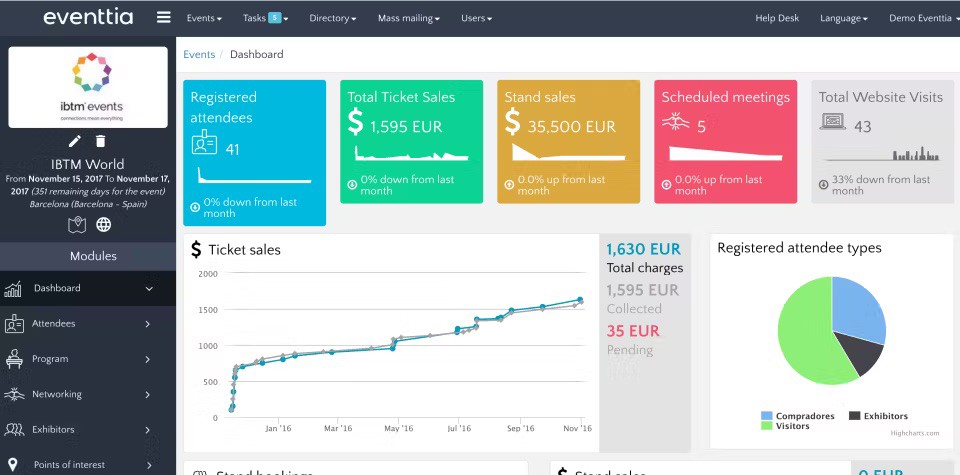
Eventtia gives organizers granular control over every aspect of their event. Its event management software supports custom registration paths, multilingual support, and B2B matchmaking. Academic organizers will appreciate its flexibility, although there’s a slight learning curve. Unlike Whova, it doesn’t box you into rigid templates; it is a strong option if you need adaptable tools without sacrificing structure.
|
Feature |
Included |
|
For academic, scientific and research-based conference |
No |
|
Abstract management |
X |
|
Can you capture the author information in the submission form? |
X |
|
Peer-review capabilities |
X |
|
Track/Topic committee management |
X |
|
Conference website builder |
✔ |
|
Program builder with sessions |
✔ |
|
AI assistant |
X |
|
Certificate of attendance |
X |
|
Virtual poster sessions |
X |
|
Integration capabilities (API) |
✔ |
|
Pricing model |
License plans |
|
Ease of use |
High |
|
Gamification |
X |
Guidebook: Best for User-Friendly Mobile Conference Apps
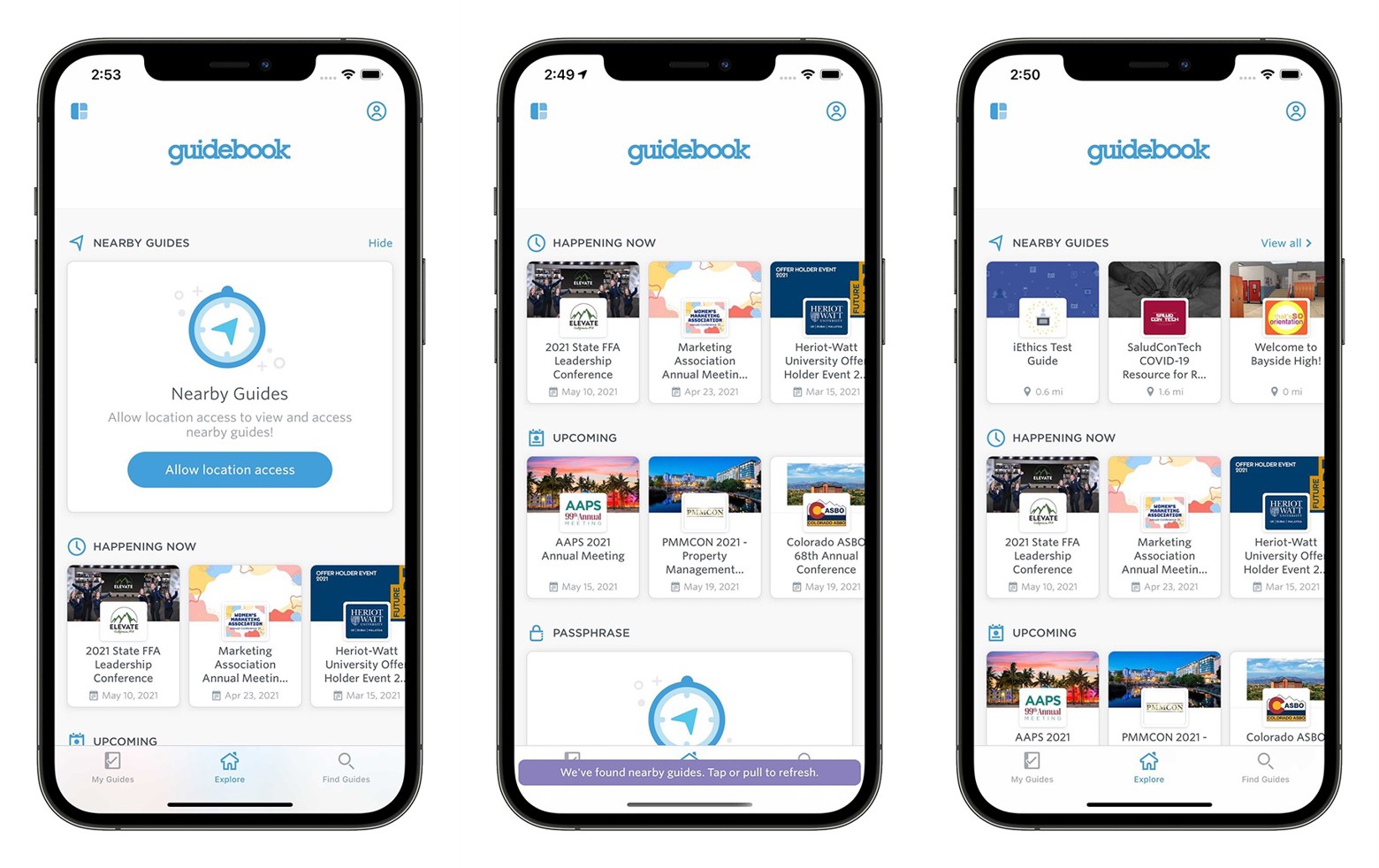
Guidebook is known for simplicity and a polished mobile experience. Its intuitive interface makes it easy to build mobile agendas, push notifications, and interactive maps.
While it lacks features that academic and research conferences need like abstract submissions and peer review, it includes features that boost the attendee experience. For conferences that rely heavily on mobile use, it’s a user-friendly Whova alternative that requires very little onboarding.
|
Feature |
Included |
|
For academic, scientific and research-based conference |
No |
|
Abstract management |
X |
|
Can you capture the author information in the submission form? |
X |
|
Peer-review capabilities |
X |
|
Track/Topic committee management |
X |
|
Conference website builder |
✔ |
|
Program builder with sessions |
✔ |
|
AI assistant |
X |
|
Certificate of attendance |
X |
|
Virtual poster sessions |
X |
|
Integration capabilities (API) |
✔ |
|
Pricing model |
License plans |
|
Ease of use |
High |
|
Gamification |
X |
Eventdex: Best for Trade Shows and Lead Management
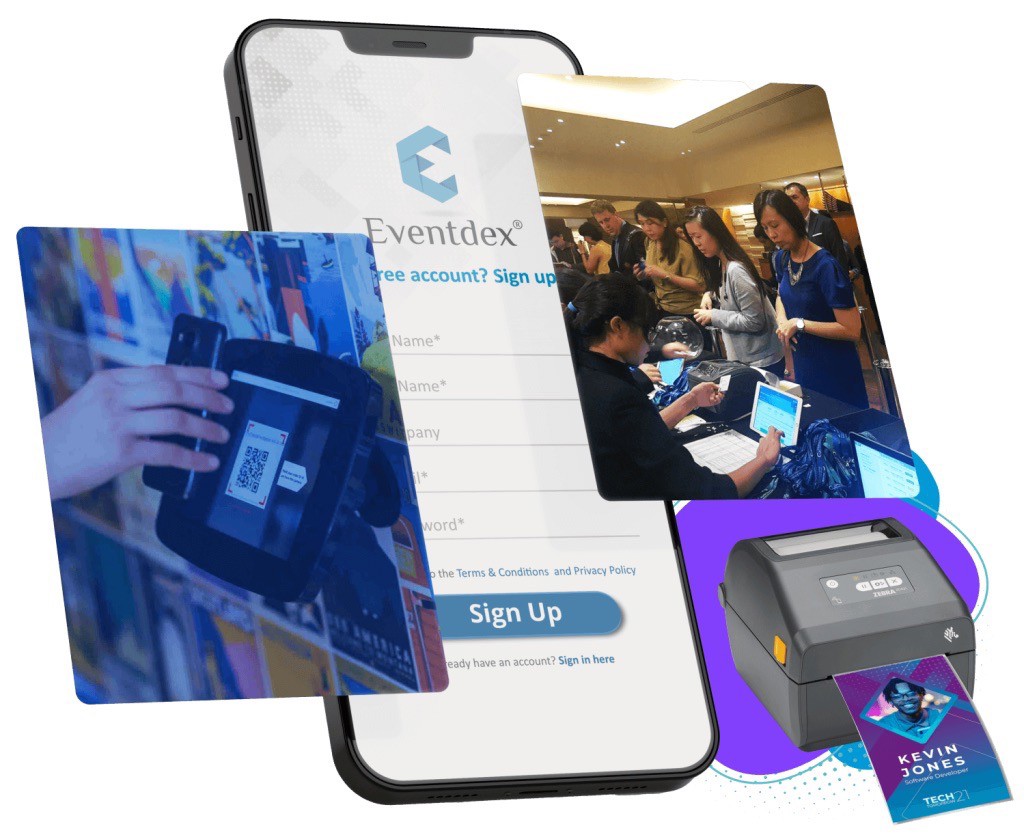
If your academic event includes an exhibit hall or sponsors expecting lead capture, Eventdex may be worth exploring. Its badge scanning, check-in tools, and CRM integrations are designed for trade shows and business-focused events.
It’s not built for academic or research-focused conferences, but for hybrid events that need strong lead management and matchmaking functions; it fills a gap Whova doesn’t.
|
Feature |
Included |
|
For academic, scientific and research-based conference |
No |
|
Abstract management |
x |
|
Can you capture the author information in the submission form? |
X |
|
Peer-review capabilities |
x |
|
Track/Topic committee management |
X |
|
Conference website builder |
✔ |
|
Program builder with sessions |
✔ |
|
AI assistant |
✔ |
|
Certificate of attendance |
X |
|
Virtual poster sessions |
X |
|
Integration capabilities (API) |
✔ |
|
Pricing model |
License plans |
|
Ease of use |
High |
|
Gamification |
X |
Eventee: Best for Quick Setup and Attendee Engagement
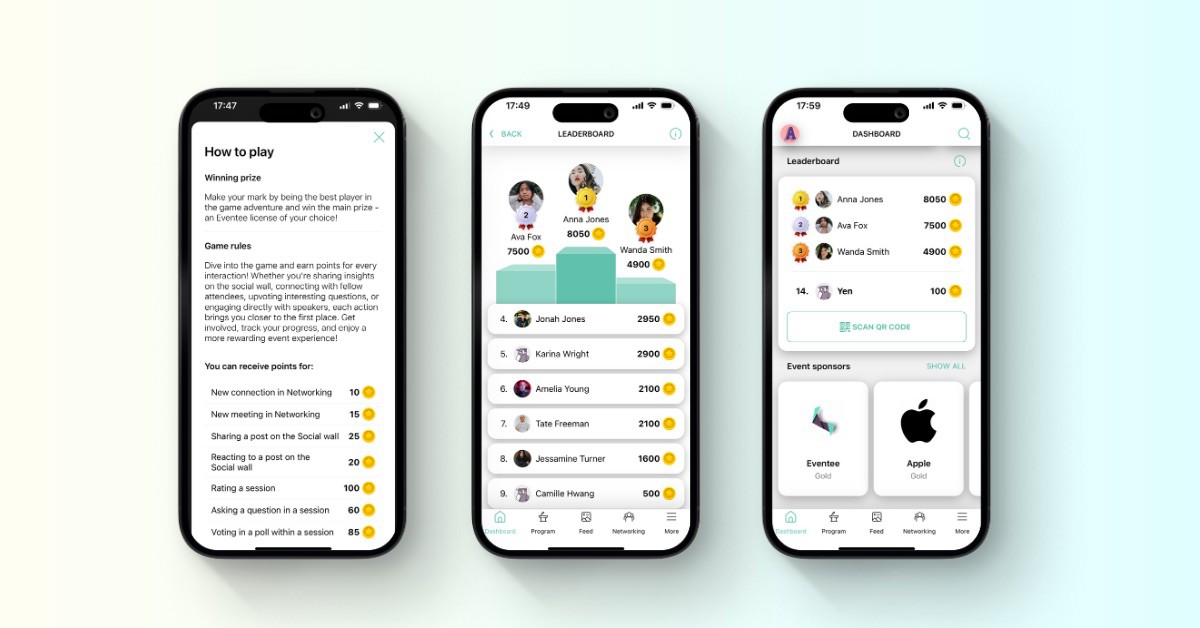
Eventee is a go-to solution for organizers wanting a straightforward, no-fuss virtual event platform. It’s simple to launch, includes built-in networking, live polls, and Q&A, and features a robust mobile interface. Although it may not tackle the complexities of academic events, it is known for attendee engagement functions and swift deployment. It’s perfect for webinars, small hybrid events, and internal conferences.
|
Feature |
Included |
|
For academic, scientific and research-based conference |
No |
|
Abstract management |
X |
|
Can you capture the author information in the submission form? |
X |
|
Peer-review capabilities |
X |
|
Track/Topic committee management |
X |
|
Conference website builder |
✔ |
|
Program builder with sessions |
✔ |
|
AI assistant |
X |
|
Certificate of attendance |
X |
|
Virtual poster sessions |
X |
|
Integration capabilities (API) |
✔ |
|
Pricing model |
License plan |
|
Ease of use |
High |
|
Gamification |
✔ |
Cvent: Best for Enterprise-Grade Event Management
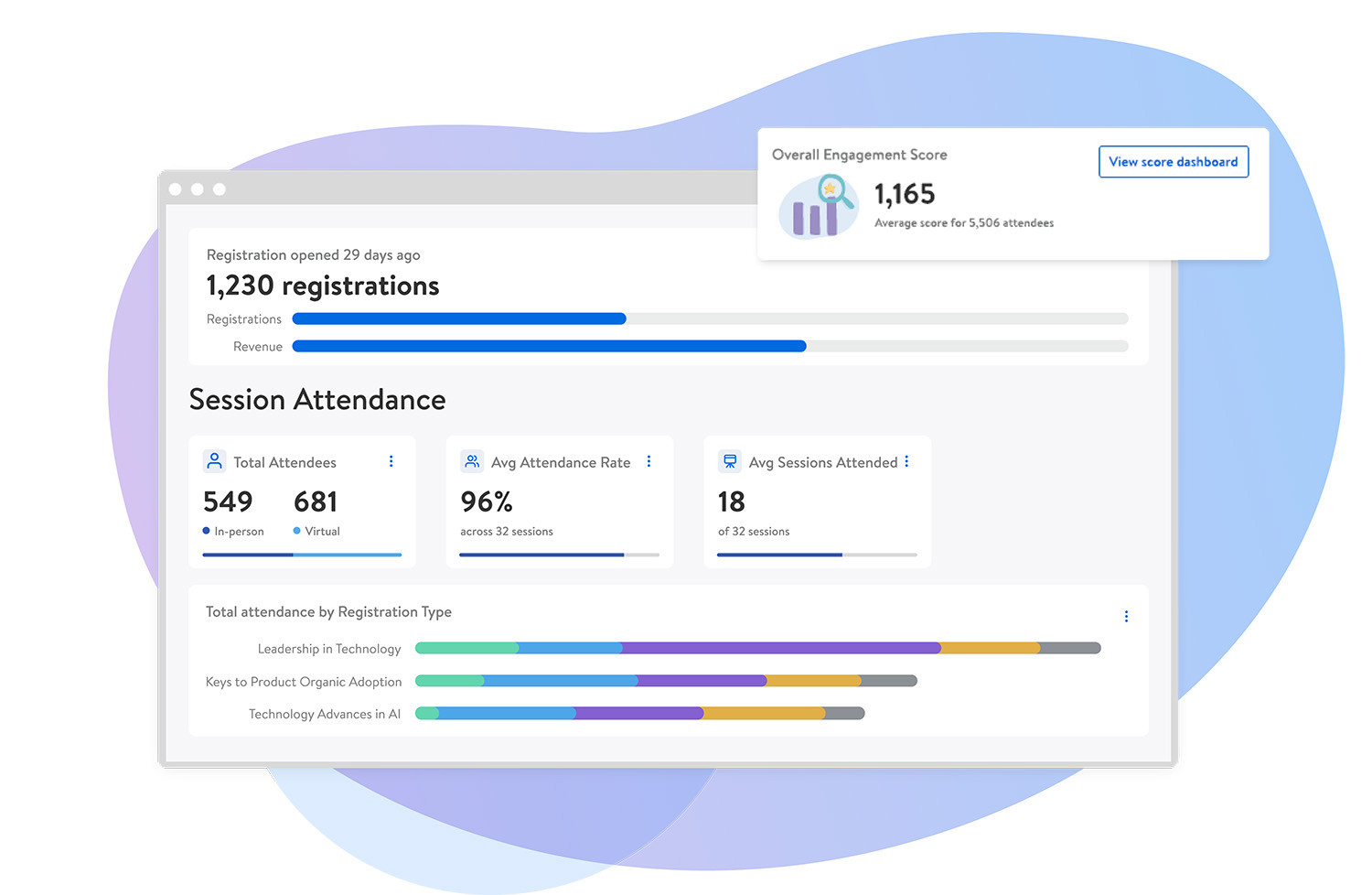
Cvent is the juggernaut of event management software. It’s robust, feature-rich, and deeply integrated with tools for marketing, budgeting, and analytics. It’s often used for enterprise-scale events with large teams and budgets.
But that comes at a cost, literally. Cvent’s pricing and complexity make it overkill for many academic organizers, although it’s a powerful alternative to Whova for institutions planning high-profile conferences or that have a business element to it.
|
Feature |
Included |
|
For academic, scientific and research-based conference |
No |
|
Abstract management |
✔ |
|
Can you capture the author information in the submission form? |
X |
|
Peer-review capabilities |
✔ |
|
Track/Topic committee management |
X |
|
Conference website builder |
✔ |
|
Program builder with sessions |
✔ |
|
AI assistant |
X |
|
Certificate of attendance |
✔ |
|
Virtual poster sessions |
X |
|
Integration capabilities (API) |
✔ |
|
Pricing model |
Quote required |
|
Ease of use |
Medium |
|
Gamification |
✔ |
Bizzabo: Best for Data-Driven Event Personalization
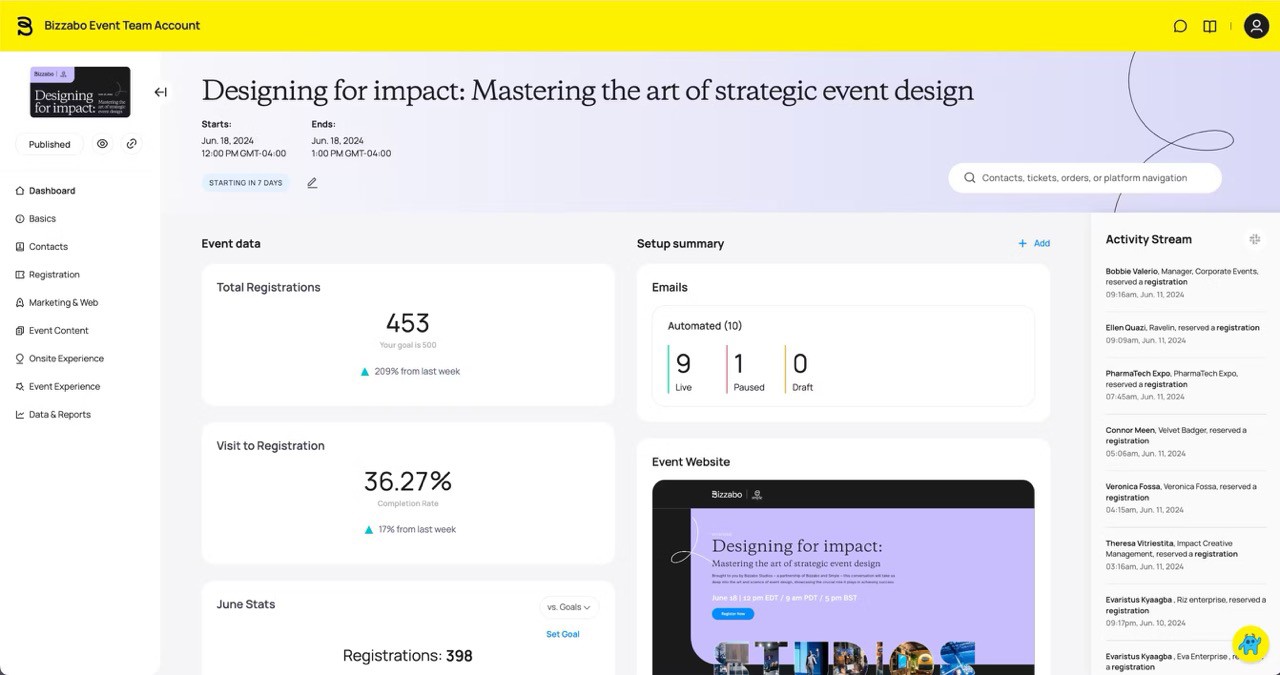
Bizzabo stands out for its focus on attendee data and personalization. With AI-powered content suggestions, CRM integrations, and real-time analytics, event organizers can deliver smarter, more personalized experiences. It’s more marketing-oriented than Whova and doesn’t cater specifically to academia, but it’s a strong contender if data insights and automation are your top priorities.
|
Feature |
Included |
|
For academic, scientific and research-based conference |
No |
|
Abstract management |
X |
|
Can you capture the author information in the submission form? |
X |
|
Peer-review capabilities |
X |
|
Track/Topic committee management |
X |
|
Conference website builder |
✔ |
|
Program builder with sessions |
✔ |
|
AI assistant |
✔ |
|
Certificate of attendance |
X |
|
Virtual poster sessions |
X |
|
Integration capabilities (API) |
✔ |
|
Pricing model |
Quote required |
|
Ease of use |
High |
|
Gamification |
X |
Eventbrite: Best for Simple Ticketing and Public Events
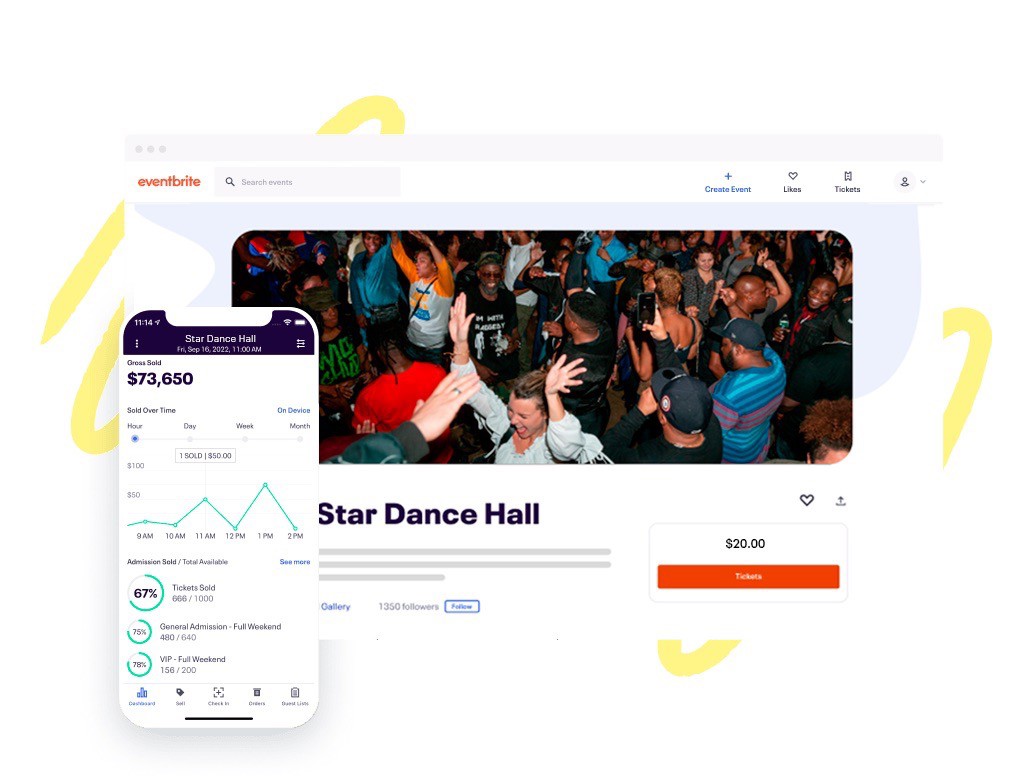
Eventbrite remains one of the most recognizable names in the space. And for good reason. Its straightforward ticketing system and public event visibility make it conducive for academic events aimed at the general public or large communities.
However, it doesn’t include features for abstract management, peer review or scientific content management. For quick registration and payment processing, however, it’s a reliable and easy-to-use Whova alternative.
|
Feature |
Included |
|
For academic, scientific and research-based conference |
No |
|
Abstract management |
X |
|
Can you capture the author information in the submission form? |
X |
|
Peer-review capabilities |
X |
|
Track/Topic committee management |
X |
|
Conference website builder |
✔ |
|
Program builder with sessions |
✔ |
|
AI assistant |
✔ |
|
Certificate of attendance |
X |
|
Virtual poster sessions |
X |
|
Integration capabilities (API) |
✔ |
|
Pricing model |
Service fees per ticket and payment processing fees |
|
Ease of use |
High |
|
Gamification |
X |
Stova: Best for Complex Conference Logistics
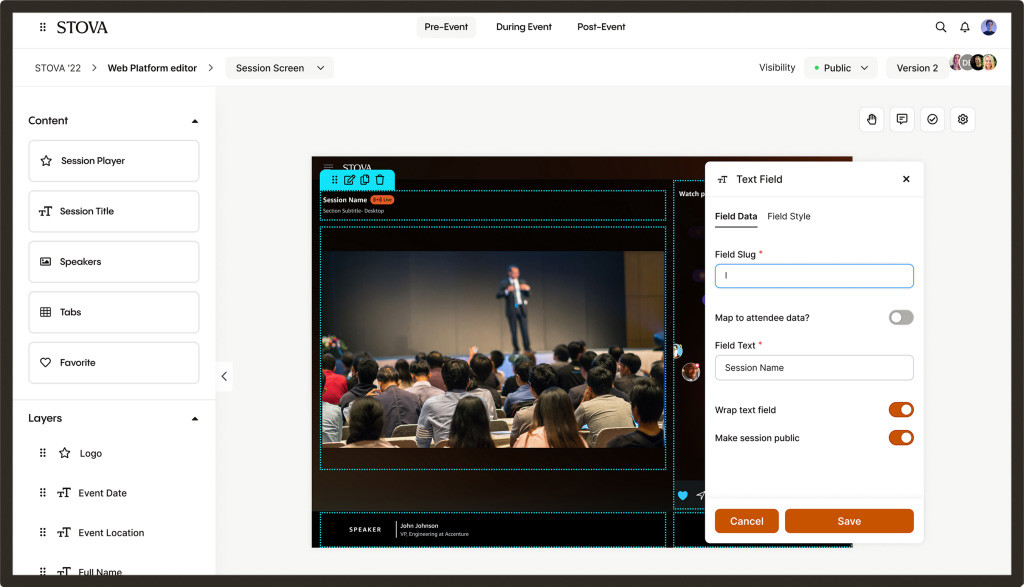
Formerly Aventri, Stova is designed to manage large, multi-day events with complex logistics, encompassing room assignments, speaker management, and check-ins. Its interface isn’t the most intuitive, but the backend capabilities are robust. If your academic event requires high-touch coordination across multiple teams, Stova can step up where Whova falls short, especially for in-person experiences.
|
Feature |
Included |
|
For academic, scientific and research-based conference |
No |
|
Abstract management |
✔ |
|
Can you capture the author information in the submission form? |
✔ |
|
Peer-review capabilities |
✔ |
|
Track/Topic committee management |
✔ |
|
Conference website builder |
✔ |
|
Program builder with sessions |
✔ |
|
AI assistant |
X |
|
Certificate of attendance |
X |
|
Virtual poster sessions |
X |
|
Integration capabilities (API) |
✔ |
|
Pricing model |
Quote required |
|
Ease of use |
Medium |
|
Gamification |
X |
Swapcard: Best for AI-Powered Networking
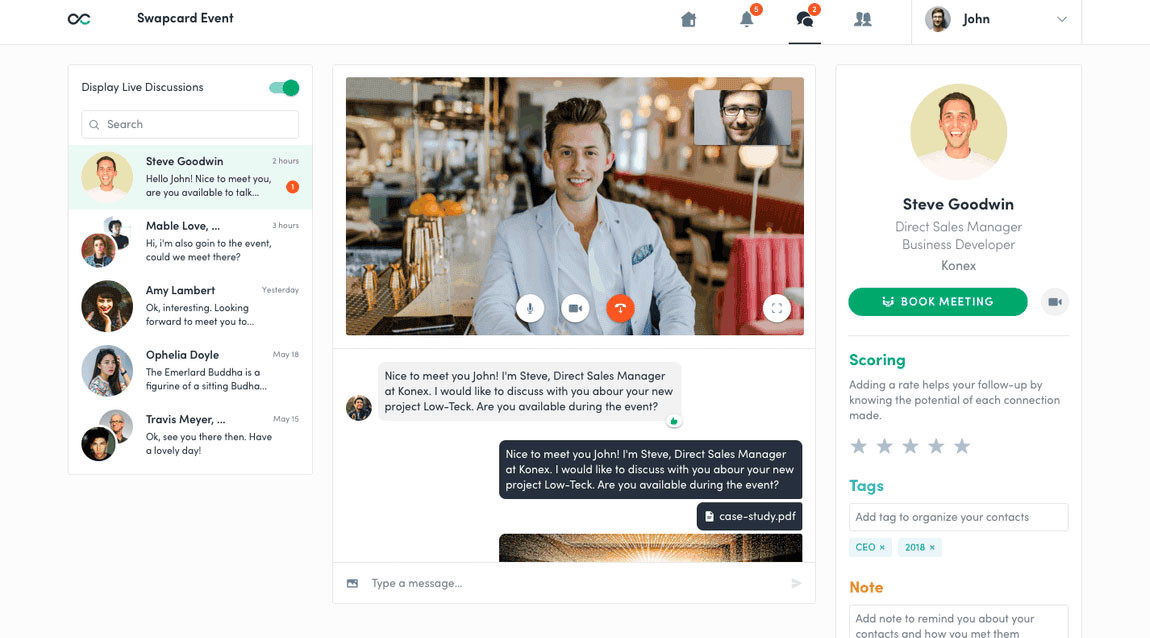
Swapcard puts networking front and center with smart matchmaking algorithms, meeting scheduling, and virtual booths. It’s designed to foster attendee engagement, especially for hybrid or virtual formats. While not an academic-first platform, its flexibility and user experience make it a valuable Whova alternative for organizers who want to enhance collaboration and attendee interaction.
|
Feature |
Included |
|
For academic, scientific and research-based conference |
No |
|
Abstract management |
X |
|
Can you capture the author information in the submission form? |
X |
|
Peer-review capabilities |
X |
|
Track/Topic committee management |
X |
|
Conference website builder |
X |
|
Program builder with sessions |
✔ |
|
AI assistant |
✔ |
|
Certificate of attendance |
X |
|
Virtual poster sessions |
X |
|
Integration capabilities (API) |
✔ |
|
Pricing model |
License plans |
|
Ease of use |
High |
|
Gamification |
X |
EventMobi: Best for Gamification and Attendee Engagement
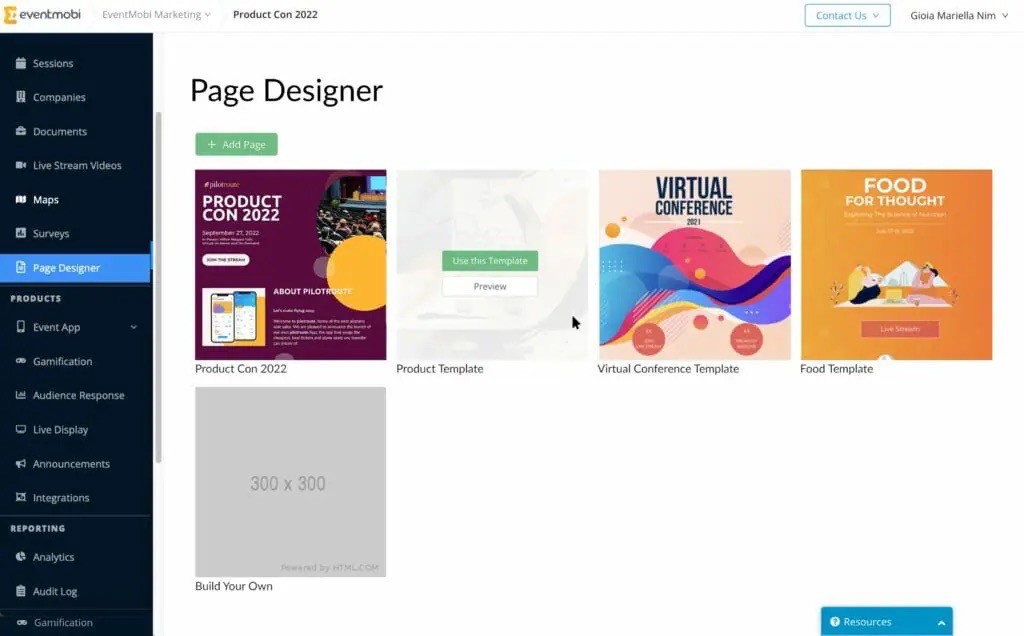
If boosting attendee engagement is your goal, EventMobi has features like gamification, live polls, and mobile-friendly interfaces. It’s an excellent choice for virtual and hybrid events seeking an energy boost. While academic organizers might find it less suited for content-heavy workflows, it’s a fantastic option to enhance the overall event experience in ways that Whova doesn’t always accomplish.
|
Feature |
Included |
|
For academic, scientific and research-based conference |
No |
|
Abstract management |
X |
|
Can you capture the author information in the submission form? |
X |
|
Peer-review capabilities |
X |
|
Track/Topic committee management |
X |
|
Conference website builder |
✔ |
|
Program builder with sessions |
✔ |
|
AI assistant |
X |
|
Certificate of attendance |
X |
|
Virtual poster sessions |
X |
|
Integration capabilities (API) |
✔ |
|
Pricing model |
Per event, annual subscription |
|
Ease of use |
High |
|
Gamification |
✔ |
Key Features to Consider in an Academic Event Management Platform
Not all event management platforms are built with academic or research conference needs in mind. From abstract submissions to peer review workflows and author affiliations, the details matter. Before committing to a Whova alternative, ensure it checks the right boxes for your academic event experience.
Abstract Management and Peer Reviews
- Flexible submission forms: The submission forms need to be flexible enough to customize each field and allow for capturing different information depending on the submitter's choice. For example, different presentation types require different sets of questions.
- Structured author capture: Whova only provides a text box. With Fourwaves, you can capture precise author information. Additionally, we distinguish between the submitter, presenters, and other authors, which allows for targeted email communication and enables sharing accurate information in the program, among other benefits.
- Multi-stage process: Often, submitters whose submissions are accepted are required to return to their forms to make edits or upload supporting documents.
- Bulk file export: With Fourwaves, you have dedicated fields to collect supplementary materials (poster, slides, videos, images and even other custom files). You can mass export those files into organized folders, ready for the day of the event.
- Abstract booklet: The ability to automatically generate an abstract booklet is vital, whether for sharing with attendees, for archival purposes, or for creating proceedings that can be sent to a publisher. The booklet contains detailed abstracts, which are sometimes grouped and sorted in a specific manner. They may also need to include images. It often features an author index with associated abstract numbers. Completing this manually is extremely time-consuming and prone to errors. Fourwaves enables you to create a customized Abstract Booklet in a Word document, allowing for further editing and formatting.
- Flexible abstract numbering: Being able to number presentations with a custom nomenclature is extremely helpful. Organizers can use this numbering for internal communications, which helps structure the program and benefits participants. For example, P85 for Poster #85 or S3.O1 for oral presentation 1 of Session 3. Whova lacks this feature. In Fourwaves, you can modify the presentation numbers to correspond with your own custom nomenclature.
- Reports: It’s crucial to filter and sort submissions using form fields, for instance, to generate custom reports, send targeted emails, build the program easily, or manage reviewer assignments. Whova provides limited information about your submissions in the data section, while Fourwaves offers comprehensive data with advanced sorting and filtering options. For instance, you can filter for submissions missing a required file, such as a poster or PowerPoint presentation, and send a mass email to the submitters.
Multi-Track Management
- Committees per track: It’s especially important for larger events to designate specific committee members who will manage submissions for specific tracks.
- Track chairs' roles: Track chairs must oversee and manage the peer-review process, make decisions, and schedule submissions for their sessions.
Peer Reviews
- Blind-review modes: You may need to accommodate both single- and double-blind processes. Unlike Whova, Fourwaves allows you to control precisely which fields are visible to reviewers; for instance, you can hide submitter and author information.
- Share feedback with authors: Academic events often require the automatic sharing of review results with authors, allowing them to revise their submissions.
- Flexible rubrics: Customizing the reviewing form is essential for a thorough review process. It often requires more than just scores from 1 to 5. Qualitative comments and even file uploads are often necessary; for instance, a reviewer may want to share a revised version with tracked changes.
Session Scheduling and Agenda Management
- Sessions with nested presentations: In academic events, you should have sessions that can contain presentations (submissions) within them, each with its own presentation times.
- Drag-and-drop builder: It should be simple for a program chair to drag and drop presentations to reorder them efficiently.
- Grid view: It’s important to be able to view the program in a grid-like format to clearly show parallel sessions, rather than a linear program. This helps participants plan their agenda.
- Personal agenda: Participants should be able to create their own personal agendas and bookmark their presentations and sessions.
- Program export: It’s common at academic events to export the program (simplified or detailed with presentation and author information) and share it with participants.
Registration and Payments
-
- Flexible forms: The registration forms must accommodate various registration types, which can include different sets of questions (for example, with conditional logic). Additionally, it is often necessary to have the option to add extra items with a cost, such as social activities, workshops, keynote dinners, and more.
- Early-bird and variable pricing management: You may need to customize different costs for the same item. Be cautious of rigid ticket-based registration systems that compel you to create numerous tickets for each registration-type-price combination, as these can disrupt your data and confuse registrants.
- Integration with submissions to identify unregistered presenters: It is often necessary to determine whether a presenter is registered. This requires the integration of registration and submission data. Some platforms, such as Fourwaves, even provide dedicated flags and filters to quickly identify and contact non-registered presenters.
- Cancellations and choice updates: Participants sometimes want to cancel one specific item they paid for and switch it to another that’s more or less expensive. Some platforms are rigid, forcing you to keep track of changes in external files and process refunds externally, which prevents you from having an up-to-date data source. This can lead to confusion for your organizing team and participants.
- Cancellations and choice updates: Attendees sometimes want to cancel one specific item they paid for and switch it to another that’s more or less expensive. Some platforms are rigid, forcing you to keep track of changes in external files and process refunds externally, which prevents you from having an up-to-date data source. This can lead to confusion for your organizing team and participants.
Integrations
- Integration with membership platforms: Occasionally, it is essential to integrate with membership platforms to offer discounted rates to members without the need to manually cross-check each form and pursue non-members who paid the member rates.
Attendee Engagement Tools
- Access to content: Engagement among participants is important not only during the event but also before and after. It should be easy for participants to explore the program, browse presentations, and review supplementary materials, thereby better preparing for the event and enhancing their overall experience.
- Async Q&A: Participants should be able to ask questions asynchronously of presenters, either on public discussion boards or by sending private messages.
- Virtual poster sessions: For virtual events, virtual poster sessions are needed for academic and scientific gatherings. The software must efficiently organize these sessions to maximize engagement and interaction.
Integration Capabilities
- Payment gateways: Academic and scientific events need a platform that is compatible with payment gateways commonly used by higher education institutions, such as TouchNet, Global Payments, Moneris, Stripe, and PayPal.
- Institution approved: Platforms approved by academic institutions, such as Fourwaves, are a plus.
- SSO: SSO (SAML/OAuth) is frequently recommended by institutions.
- APIs: Associations often require APIs to connect with membership platforms or synchronize data with external tools.
Event Website Customization and Branding
- Easy to edit: Event websites must be easily editable through an intuitive interface, as academic and scientific event organizers are often busy academics.
- All-in-one format: Event websites need to include registration, submissions, the program, and all necessary pages to share event information such as venue details, transportation, visa applications, submission guidelines, and more.
- White-label and contemporary: modern and white-labeled for a professional look and feel.
- CSS override: This allows for more in-depth customization.
Website Accessibility Post-event
- Accessibility of previous editions: Academic and scientific events are often run annually and need an archive of previous editions. This is useful to dig through previous editions and content as well as help with grants and sponsorships.
Pricing and Scalability
- Affordable pricing: Academic and scientific events operate on limited budgets, so the pricing needs to be reasonable and transparent.
Streamline Your Academic Conference Planning with Fourwaves
Planning your first academic event? Or juggling a growing list of tasks for your tenth? Either way, Fourwaves is an all-in-one event management platform that makes event management feel less like a maze and more like mission control. From the moment you sign up, you’re working with a conference event registration software built to move fast and think like an academic.
You get everything in one place: a polished event website, abstract submissions, peer review, scheduling, and registration. It’s all modular, modern, and actually intuitive. In fact, most first-time organizers using Fourwaves’s event website builder have their event site live in under two hours (yes, really—we checked the data).
And the best part? You don’t need to hop on a sales call or commit to a demo. With a free sandbox environment, you can explore the event management platform at your own pace (without any pressure!) and see exactly how it fits into your workflow before making a decision.
Whova Alternative FAQs
Yes, Fourwaves, Oxford Abstracts, Ex Ordo, ConfTool focus on those types of events and include advanced abstracts and peer-review functionalities.
Look for livestream capabilities, virtual poster sessions, dual onsite/virtual attendee modes and a mobile app.
It depends on your event goals. For academic and scientific events, look for customization capabilities and features related to call for abstracts, peer review, and session building with nested presentations.
For example, the ability to capture precise author information, manage revision rounds or generate an abstract booklet.
Yes, Fourwaves is an event management platform that has a completely free package. It only charges if you collect credit card transactions.


